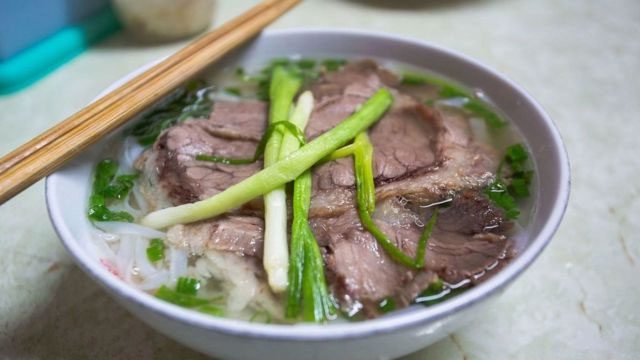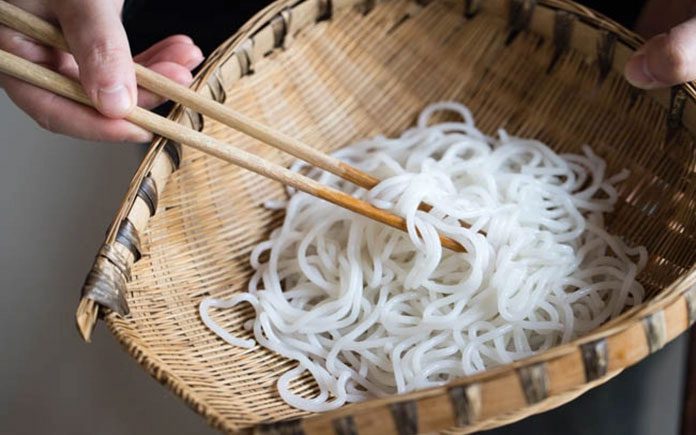In the morning, Vietnamese people often prefer hearty and filling foods to ensure they have enough energy for a long day of work and activities.
Common Mistakes When Eating Noodles and Pho That Should Be Changed Immediately
For many people, noodles and pho are the “national dishes” enjoyed for breakfast. Moreover, many choose to eat noodles or pho whenever they want or when they are busy. A bowl of noodles or pho typically contains a variety of nutrients from carbohydrates, proteins, and fiber, making it a warm and delightful option to savor at the start of a new day.
However, nutrition experts indicate that we should not overindulge in any one dish. It is best to have a diverse breakfast with various foods to ensure a well-rounded intake of nutrients. According to the National Institute of Nutrition, a complete breakfast should consist of four food groups: carbohydrates, proteins, fats, vitamins, and minerals.
Thus, we can enjoy noodles and pho a few days a week, but it is important to keep the following points in mind to avoid negatively impacting our health.
Eating too quickly and not chewing properly
Both noodles and pho are water-rich dishes, which can lead to the habit of eating quickly and not chewing thoroughly. However, eating too fast means that food is not properly digested in the mouth and is sent directly to the stomach in a coarse form, potentially harming the stomach lining and increasing the burden and time needed for this organ to function.
According to Associate Professor Dr. Nguyen Thi Viet Ha (Head of the Gastroenterology Department at the Central Pediatric Hospital), many cases of gastric ulcer are attributed to the excessive consumption of noodles and inadequate chewing. The doctor advises that parents should limit giving noodles to young children, as their digestive systems are often not well developed.
Drinking pho broth that is too hot

Foods with temperatures above 65°C can increase the risk of cancer in the oral cavity…
Savoring hot bowls of noodles and pho is a joy for many people who enjoy the experience of slurping while eating. However, the World Health Organization (WHO) has classified the consumption of excessively hot foods as one of the causes of cancer. Accordingly, foods with temperatures above 65°C can increase the risk of cancer in the mouth, throat, and esophagus. These injuries can be caused by high temperatures and can eventually lead to the proliferation of cancer cells. Therefore, to protect health, families should wait for the noodles to cool to about 50-60°C before eating and can divide the noodles into smaller bowls to help them cool faster.
Eating noodles that are excessively white
Noodles are a popular dish that can be found almost everywhere; however, the additives used in noodles often raise concerns due to their difficulty to control and lack of clear labeling. Associate Professor Tran Hong Con (a chemistry expert at the University of Science, Hanoi) has stated that authorities have previously discovered fluorescent agents (known as tinopal) used in noodle production to make the noodles look translucent, chewy, and visually appealing. This substance is very dangerous and can cause health issues such as liver failure, kidney failure, and cancer.
Additionally, borax is another substance commonly used in noodle production, and prolonged consumption can lead to digestive poisoning and harm the kidneys. To ensure health, consumers should opt for noodles that are opaque, break easily, and feel slightly sticky and soft to the touch. In contrast, noodles that are excessively white and overly chewy may have been treated with borax and fluorescent agents.

Consumers should choose noodles that are opaque, break easily, and feel slightly sticky…
Eating noodles frequently when having digestive issues
Associate Professor Dr. Nguyen Thi Lam (former Deputy Director of the National Institute of Nutrition) warns that noodles are not suitable for individuals suffering from digestive diseases. This is because noodles are made from rice flour, soaked in water for about a day to allow the flour to expand, during which time the starch can ferment and create a sour taste. Consuming too many noodles can lead to bloating, discomfort, indigestion, and harm the stomach of those with digestive ailments.
Moreover, eating noodles or pho while unwell can lead to issues such as abdominal coldness, indigestion, diarrhea, or may make the body feel heavier. Instead of consuming noodles or pho during this time, it is advisable to consider porridge or soup to lessen the burden on the digestive system and aid in quicker recovery.


















































